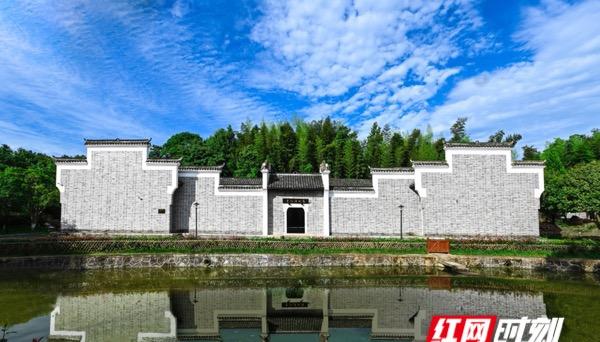Editor's note: Romantic as a poet, but as tough as steel, the blood-colored romance on the red hot soil is vividly expressed in the first poem, which is either generous or tragic. Hunan, the main birthplace and source of the Chinese revolution, the surging revolutionary wave, the arduous revolutionary struggle, the brilliant revolutionary figures, and countless moving stories, make this red hot land have inexhaustible motivation. This year marks the 100th anniversary of the founding of the Communist Party of China, and the Red Net takes you to feel the red mountains and rivers refined from blood and fire from those poems that are beautiful or miserable but have never given up their faith and ideals.
Red Net Moment reporter Chen Minying Ren Ye Chen Aonan Zhang Meng Reported from Changsha
Spring back to the earth hundred peanuts,
The whole country rejoiced in the new day.
I am inexhaustible,
The disabled years have the ambition to regret the evening sunshine.
In 1984, it was the last Spring Festival of Li Weihan's life spent in his hospital bed. In the festive and peaceful atmosphere, he chanted: "Spring returns to the earth with hundreds of peanuts, and the whole country celebrates the new day." I am exhausted by the salary, and I have the ambition to regret the evening sunshine in my disabled years. ”
At that time, Li Weihan's physical condition was already very bad, but he still insisted on recalling, collecting, and sorting out the history of the party. Knowing that he might not be able to complete the work in a limited time, he wrote this poem to express his regrets.
A big thing was done

Li Weihan's former residence.
Comrade Li Weihan was born on June 2, 1896 in Changsha County, Hunan Province, to a poor intellectual family. Li Weihan worked with Mao Zedong, Cai Hesen and others to organize the Xinmin Society in Changsha. Together with Comrades Zhao Shiyan, Zhou Enlai, and other comrades, he formed the Young Chinese Communist Party in Europe and was responsible for organizational work. At the end of 1922, he was introduced by Comrades Mao Zedong, Cai Hesen to join the Communist Party of China, and participated in and witnessed the party's struggle throughout the process.
On the eve of the founding of the People's Republic of China, during the preparations for the new CPPCC session, Mao Zedong specifically consulted Li Weihan on whether to implement the federal system. After in-depth study, Comrade Li Weihan held that the historical development and specific conditions of our country and the Soviet Union are different, and it is not appropriate to implement a federal system, and suggested that the autonomous area system be implemented in a unified unitary state.
The Party Central Committee adopted this proposal, and the system of regional ethnic autonomy was enshrined in the Constitution and established and inherited as the basic political system of our country. Since then, on the basis of summing up the experience of promoting regional ethnic autonomy, Comrade Li Weihan has presided over the formulation of the "Outline for the Implementation of Regional Ethnic Autonomy of the People's Republic of China," which has become China's first legislation on ethnic issues.
In 1951, Li Weihan participated in the negotiations for the peaceful liberation of Tibet as a plenipotentiary representative of the central government.
The negotiations mainly clarified the relations between the central and local governments in Tibet and the unity within Tibet. When differences and controversies arose, Li Weihan listened carefully to the opinions of the Tibetan side in accordance with the instructions of the central authorities, consulted with an equal attitude, and patiently explained them, and finally the two sides signed the "Agreement on Measures for the Peaceful Liberation of Tibet."
After the negotiations, Mao Zedong received the negotiators, shook Li Weihan's hand, and said: "You have done a big thing, it is remarkable!" ”
"The disabled year has the ambition to regret the evening sunshine"
Li Weihan, who wrote revolutionary memoirs in his later years.
From 1979 onwards, Comrade Li Weihan responded to the call of the Central Committee and began to systematically write revolutionary memoirs. Li Weihan, who is now 80 years old, regards completing this task as his last task for the party.
Looking back on the party's history, Li Weihan once proudly said: "Our party is at least one of the most experienced communist parties in the world. We are a great power, and in the future our Party history will be like a great edifice. "The old cadres should collect a little brick and tile for the party to build this building."
Maybe he knew he didn't have much time, so he raced against the clock. Every morning at 6:30 a.m., in addition to a simple breakfast and Chinese food, Li Weihan has been working all day.
He had to recall for more than half a century, and the writing task was very heavy, so he first took oral recordings, organized them into a written manuscript, and then carefully revised them. Thanks to the rescue recording, his Memories and Studies were able to be completed after his death, but the last part could not be personally revised.
In the case of an elderly age and serious illness, Li Weihan still worked hard and revised the manuscript with the mentality of "I am inexhaustible for collecting salaries, and I have the ambition to cherish the late sunshine in my disabled years" until the last moment of his life.
Standing at the historical crossroads of the "two hundred years" goal, only by constantly inheriting and carrying forward the spirit of the older generation of Communist Party members represented by Li Weihan and bowing down and dying after death, and closely linking their life goals with the needs of the motherland, can we hold the baton of history and contribute our strength to the realization of the Chinese dream.